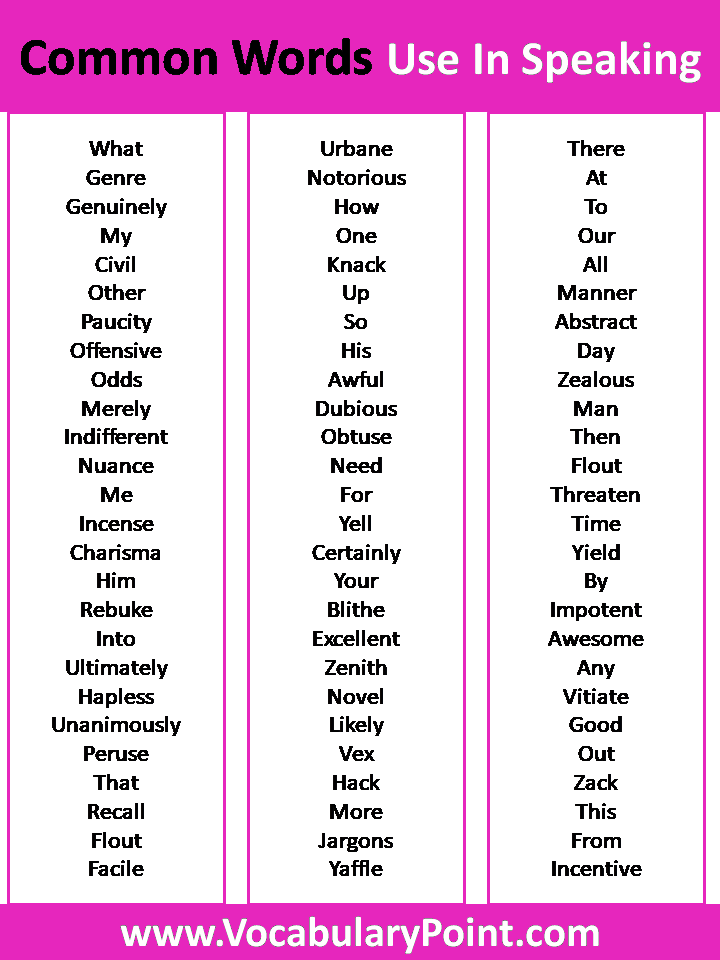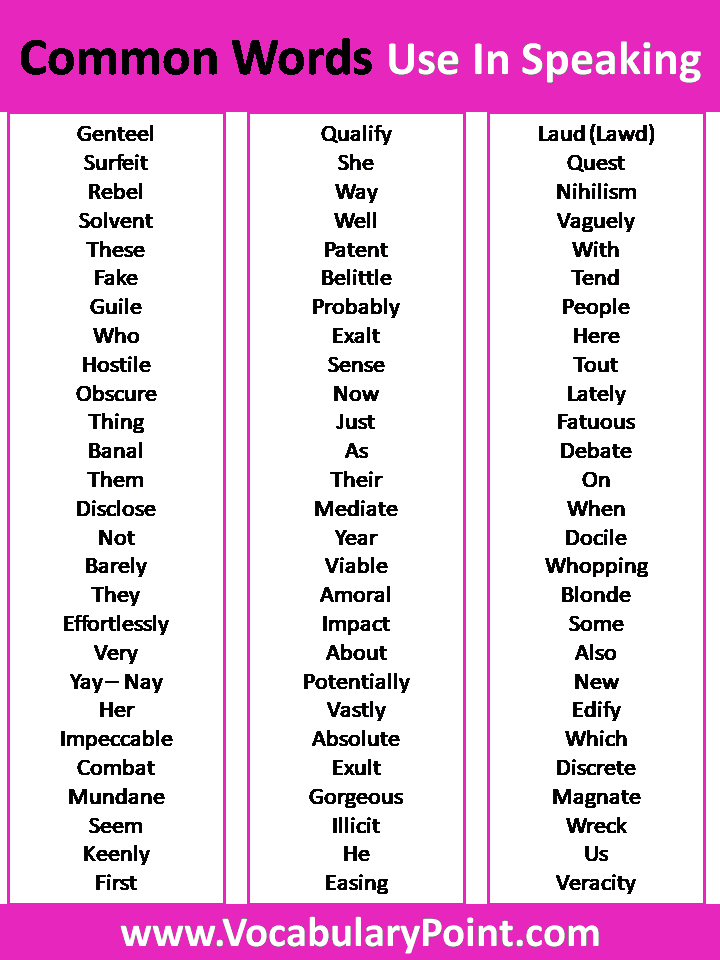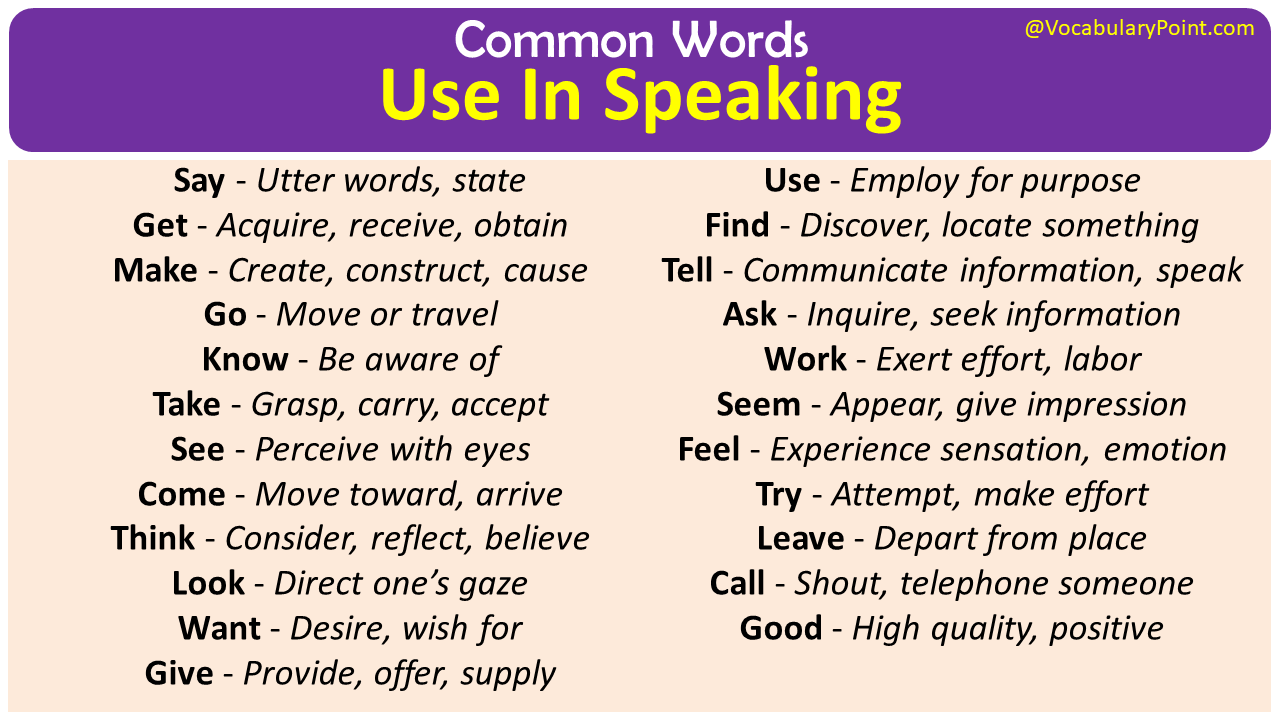When we talk, we often use certain words a lot without even noticing. These words are simple but very important for making sentences and sharing our ideas. In this blog post, we will look at some of the most common words used in everyday speaking. Knowing these words will help you understand more of what others say and improve your own English speaking skills. Let’s dive into these words and see how you can use them in your daily conversations!
Common Words Use In Speaking
- And – Connects related items
- The – Specifies, identifies noun
- Be – Exist, occur, become
- Of – Indicates relationship, belonging
- To – Expresses motion, direction
- With – Accompanied by, having
- He – Refers to male
- Have – Possess, own, hold
- Do – Perform an action
- Say – Utter words, state
- Get – Acquire, receive, obtain
- Make – Create, construct, cause
- Go – Move or travel
- Know – Be aware of
- Take – Grasp, carry, accept
- See – Perceive with eyes
- Come – Move toward, arrive
- Think – Consider, reflect, believe
- Look – Direct one’s gaze
- Want – Desire, wish for
- Give – Provide, offer, supply
- Use – Employ for purpose
- Find – Discover, locate something
- Tell – Communicate information, speak
- Ask – Inquire, seek information
- Work – Exert effort, labor
- Seem – Appear, give impression
- Feel – Experience sensation, emotion
- Try – Attempt, make effort
- Leave – Depart from place
- Call – Shout, telephone someone
- Good – High quality, positive
- New – Not old, recent
- First – Before anything else
- Last – Final in series
- Long – Measuring great distance
- Great – Very good, large
- Little – Small in size
- Own – Belonging to oneself
- Other – Different, additional
- Old – Aged, not new
- Right – Correct, opposite of left
- Big – Large in size
- High – Great height, amount
- Different – Not the same
- Small – Little in size
- Large – Big in size
- Next – Following, coming after
- Early – Before usual time
- Young – Early in life
- Important – Of great significance
- Few – Not many, several
- Public – Open to all
- Bad – Poor quality, negative
- Same – Identical, not different
- Able – Having the means
- Back – Rear side, return
- Better – More desirable, superior
- Best – Most excellent, superior
- Clear – Easy to perceive
- Down – From higher to lower
- Ever – At any time
- Low – Not high, reduced
- Many – Numerous, several
- Most – Greatest in amount
- Other – Additional or alternative
- Some – An unspecified amount
- Such – Of this kind
- Only – No one else, solely
- Then – At that time
- Too – Also, excessively
- Very – To a high degree
- Well – In good health
- Where – In what place
- Why – For what reason
- Again – Another time, repeatedly
- Here – In this place
- How – In what way
- When – At what time
- Never – At no time
- Now – At the present time
- Should – Ought to, expected
- Like – Similar to, enjoy
- Just – Merely, exactly
- Less – Not as much
- Much – A large amount
- Must – Necessary, required
- Off – Away, disconnected
- Often – Frequently, many times
- Really – Actually, in fact
- Sure – Certain, without doubt
- Thing – An object, entity
- Through – From end to end
- Way – Method, path, direction
- Even – Level, balanced
- More – Additional, extra
- Most – To the highest degree
- Much – Great in amount
- What – Asks for information
- While – During the time that
Explore More:

List of IELTS Speaking Words
- Mediate
- Year
- Viable
- Amoral
- Impact
- About
- Potentially
- Vastly
- Absolute
- Exult
- Gorgeous
- Illicit
- He
- Easing
- Laud (Lawd)
- Quest
- Nihilism
- Vaguely
- With
- Tend
- People
- Here
- Tout
- Lately
- Fatuous
- Debate
- On
- When
- Docile
- Whopping

- Blonde
- Some
- Also
- New
- Edify
- Which
- Discrete
- Magnate
- Wreck
- Us
- Veracity
- We
- Candor
- No
- Two
